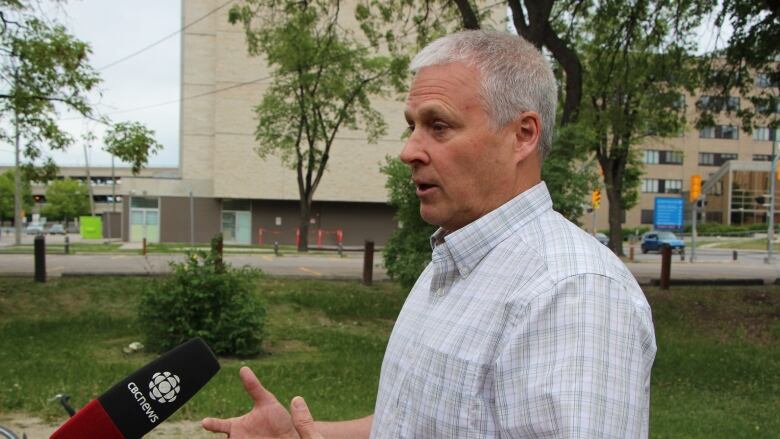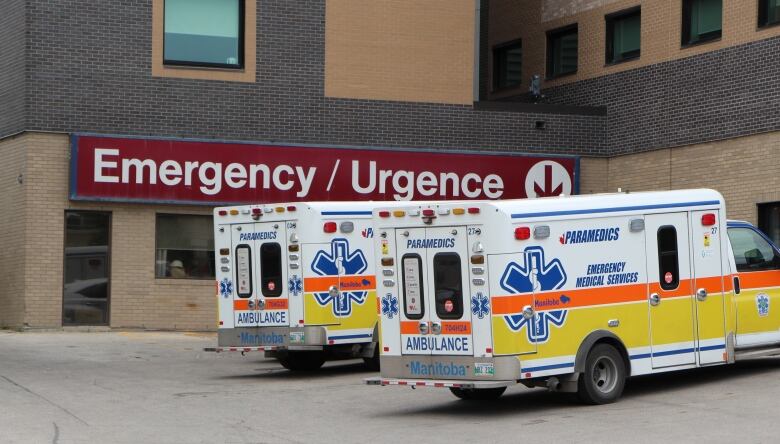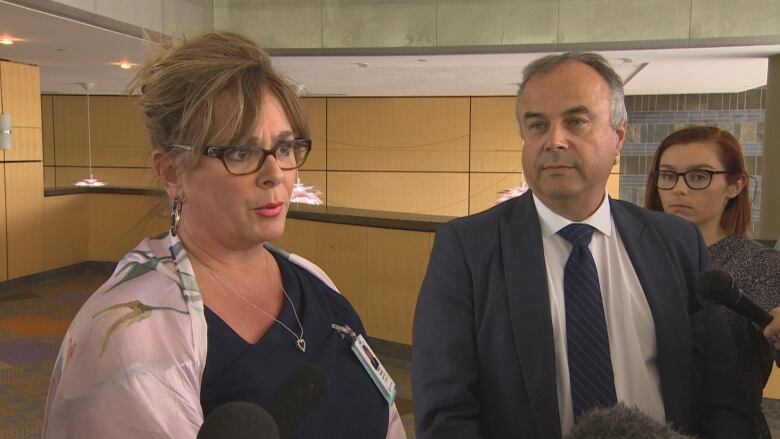'It wasn't fear-mongering': Doctor speaks out following leaked memo on capacity at St Boniface hospital ER
Hospital ER temporarily turned away non-urgent patients following influx of acutely ill patients

The ER doctor who flagged concerns about the capacity at St. Boniface hospital's emergency department is speaking out, saying the health authority is downplaying the situation.
Emergency physician Paul Doucet said he spoke to hospital administration on June 12when he arrived for his 11 a.m. shift and saw there weren't enough beds to treat several acutely ill patients.
At one point, an extremely ill patient went into cardiac arrest in the hallway because there was no bed for him.
"Unceremoniously, the patient in the other resuscitation bed was shifted [out], and that person was brought in," Doucet said Saturday.
The hospital stopped admitting some patients who did not require immediate help for nearly 24 hours beginning Wednesday afternoon.
An internal memo written as a result of Doucet's concerns was leaked to Global News the following day, detailing a "critical" and "unsafe" volume of patients.
That prompted the Winnipeg Regional Health Authority (WRHA) and hospital administration to hold a press conference.
But Dr. Doucet, who has worked in the same ER for the last 30 years, wanted to speak up after hearing the hospital and health authority's reaction to the media reports.
"The press conference seemed to minimize the concerns," he said.
"From my perspective, and I think most of the staff in the emergency department would share the perspective, that it wasn't fear-mongering, that people have legitimate concerns for patient safety and their work environment," he said.
Acutely ill patients in waiting
That day, Doucet said he arrived to see that 22 patients had been admitted into the emergency department, filling up nearly two-thirds of itshospital beds.
He said over three-quarters of the ER's high acuity beds were filled beds reserved for patients who have the most complicated, urgent and high-risk care needs.
Two of those patients were very sick and needing admission to the ICU, he said.
There also weren't enough beds to take in a large number of high acuity patients, with five or six of them already sitting in the waiting room, he said.

He said his concerns for patient safety were heightened by what he saw.
"It makes it more challenging to deliver safe care to patients when staff is overwhelmed with admitted patients," he said.
Doucet said he voiced his concerns to several administrators, which prompted the memo to redirect non-urgent cases away.
WRHA responds
In an emailed statement, the Winnipeg Regional Health Authority said while overall visits to the ER were below average that day, there was a higher-than-average number of people waiting to be admitted from the emergency waiting room to in-patient beds.
"No unusual surges of patient arrivals have been identified," the statement reads. "Patient volumes and acuity were not outside the range of what could typically be safely managed."
The statement noted, however, the ER can be unpredictable.
"We therefore accept and take very seriously the concerns expressed by staff and physicians at St. Boniface Hospital, and would like to reinforce that we encourage staff and physicians to continue escalating concerns when they arise."
The statement goes on to say the health authority and hospital leadership are working to identify "the specific factors that led to Wednesday's redirection being called at the hospital."
No plan to deal with patient influxes: ER doctor
While it's not uncommon to see the ER with patient surges of that size a few times a month, Doucet said what concerns him most is that there doesn't seem to bean effective method to deal with the issue.
"If you talk to most of the physicians who deliver in-hospital care, they feel they are under-resourced as far as beds and services," he said.
"It adds to a difficult work environment, when you're continually juggling beds, and juggling patients, and you don't have space available."
Doucet said he's concerned the transformation of Concordia's emergency room into an urgent care centre earlier this month may have played into the high number of patients at his hospital
"I think with the decreasing capacity in the system, it's more likely to happen more often," he said. "I'mvery concerned."
The WRHA denies that the redirection had anything to do with Concordia closing its ER.

The recent decision to turn Concordia's ER into an urgent care facility instead of a walk-in clinic meant some staff who were slated to join St. Boniface are no longer moving over.
Doucet said that change is prompting staffing woes at his hospital.
The health authority is currently undertaking a major consolidation of hospital care, highlighted by the closure of six emergency departments into three.
That plan includes transitioning Seven Oaks General Hospital's ER room into an urgent care facility this fall.
"Certainly it seems at present that it would be difficult on more frequent occasions to cope with the volume if Seven Oaks transitions to urgent care, so we have deep concerns," Doucet said.
The solution is more capacity and beds in the hospital system, he said.
WRHA putting a 'rosy spin' on unsafe conditions: MAHCP
The concerns of Dr. Doucet are echoed by Bob Moroz, president of the Manitoba Association of Health Care Professionals, the union representing hospital staff in fields like diagnostic imaging, cardiology, laboratories, and physiotherapy.
"The timing of the closing of the Concordia ER, and this redirection at St. Boniface how can the average Manitoban not put those two things together? It just makes no sense to me," Moroz said on Friday.
"It's really, really disheartening to continue to hear theWRHA try to continue to put a rosy spin on such an ill-conceived ... ill-executed plan. It is deeply, deeply frustrating."
With files from Ian Froese












_(720p).jpg)


 OFFICIAL HD MUSIC VIDEO.jpg)
.jpg)



























































































